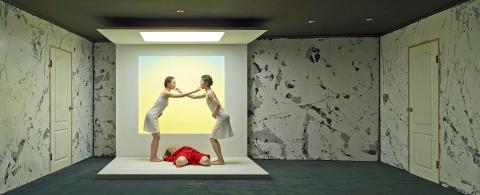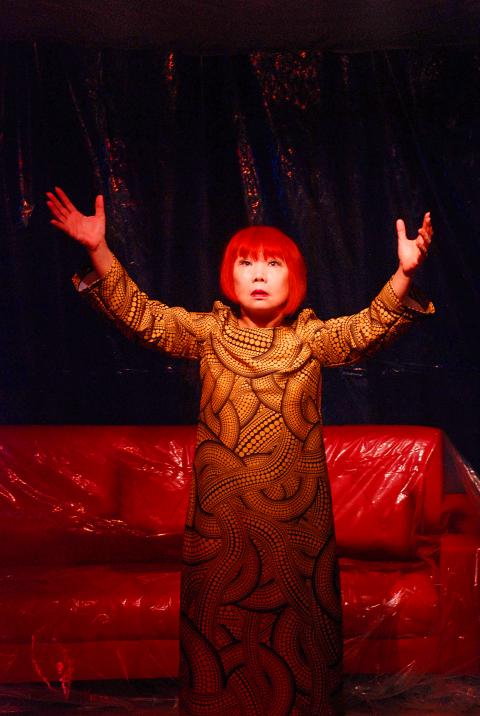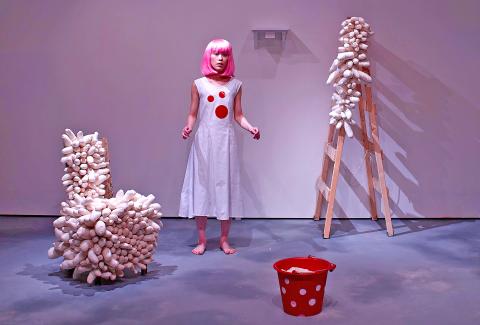Just over two years ago, Riverbed Theatre (河床劇團) staged One-thousand circles for space travel (千圈之旅), its tribute to Japanese artist Yayoi Kusama, as part of the National Theater Concert Hall’s International Theater Festival.
Not a lot of people had the chance to see the production — which sold out months in advance — because the audience numbers were limited to 50 per show. That is all that would fit into the special viewing gallery the troupe built in the Experimental Theater.
Now both Riverbed Theatre and its fans are getting a second chance.

Photo Courtesy of Art Apartment
The company was invited by the Cloud Gate Theater to restage One-thousand circles for space travel at its complex in New Taipei City’s Tamsui District (淡水), for a total of 19 shows over two weekends. However, seating is still limited as the company is sticking to the dimensions of its original production.
While Riverbed is used to remounting shows from Taipei at festivals abroad and vice versa, this is the first time it has had the chance for a second run of a production in Taipei.
LOTS OF DOTS

Photo Courtesy of Craig Quintero
Asked why Riverbed was willing to revisit One-thousand circles for space travel, Riverbed cofounder and director Craig Quintero said in a telephone interview on Sunday that it was because of Kusama herself.
“She is so willing to dig deep into herself, to create worlds that are so transporting. As an artist she is committed to her life, to her craft,” he said.
Kusama’s world, as seen through her work, is one of endless accumulation and repetition: dots, millions upon millions of dots; dots in paintings in oils, watercolors and pastels, in soft sculptures and environmental works made of mirror and lights. Then there are her films, her “performance pieces” from the 1960s in New York City and her novels.

Photo Courtesy of Craig Quintero
The patterns of dots, loops and nets are a representation of infinity; they are an inspiration and an obsession, they are hallucinatory, they are the signs of madness.
Kusama started painting dots and nets when she was 10, a child of a conservative family in rural pre-World War II Japan, struggling with mental health issues. She continued with them when she moved to the US in 1957 and when she returned to Japan in 1973.
In 1977 she voluntarily checked herself into a psychiatric sanatorium in Tokyo and has lived there ever since, while continuing to work in a studio across the street from the hospital. She has said that for her art and art therapy were one and the same.
The Art Newspaper last year announced that the “Polka Dot Princess” was the world’s most popular artist in 2014 as ranked by its annual global museum attendance survey, beating any would-be rival hands down.
‘POETIC LEAP’
Kusama, now 87, is a perfect subject for Riverbed’s surreal, image-based Total Theater and its “subconscious” productions. The company says the show is “a poetic leap into the wondrous mysteries of the human mind.”
“This is huge for us. Challenging and exciting to be rethinking things. Keeping the same basic structure, but hoping to make discoveries — like a painter who paints a picture, puts it away, pulls it out again after a while and starts making changes. A piece is never finished,” Quintero said.
The company is reusing most of its original set, which was put into storage two years ago.
“Everything is in good condition, but dusty. I had been worried about the wood warping in Taiwan’s humidity,” Quintero said. “We’re doing a lot of painting and repurposing … lots of ‘and what was this bit for?’”
While two of the original cast had to pull out because of other commitments, including art curator Victoria Lu (陸蓉之), the rest are back.
The production team at Cloud Gate has been a big help, Quintero said.
“Working at Cloud Gate is amazing, the technical support is great, they have the artist and artwork in mind,” he said.
One of the reasons the troupe is doing so many shows is to make the production more financially worthwhile for Cloud Gate, which is coproducing the revival, he said.
The Cloud Gate Theatre organizes shuttle buses from the Tamsui MRT station for all shows, but reservations must be made through its Web site or by telephone (02) 2629-8558, extension 3404. The number 836 public bus also runs to the theater from the MRT station.

The unexpected collapse of the recall campaigns is being viewed through many lenses, most of them skewed and self-absorbed. The international media unsurprisingly focuses on what they perceive as the message that Taiwanese voters were sending in the failure of the mass recall, especially to China, the US and to friendly Western nations. This made some sense prior to early last month. One of the main arguments used by recall campaigners for recalling Chinese Nationalist Party (KMT) lawmakers was that they were too pro-China, and by extension not to be trusted with defending the nation. Also by extension, that argument could be

Aug. 4 to Aug. 10 When Coca-Cola finally pushed its way into Taiwan’s market in 1968, it allegedly vowed to wipe out its major domestic rival Hey Song within five years. But Hey Song, which began as a manual operation in a family cow shed in 1925, had proven its resilience, surviving numerous setbacks — including the loss of autonomy and nearly all its assets due to the Japanese colonial government’s wartime economic policy. By the 1960s, Hey Song had risen to the top of Taiwan’s beverage industry. This success was driven not only by president Chang Wen-chi’s

Last week, on the heels of the recall election that turned out so badly for Taiwan, came the news that US President Donald Trump had blocked the transit of President William Lai (賴清德) through the US on his way to Latin America. A few days later the international media reported that in June a scheduled visit by Minister of National Defense Wellington Koo (顧立雄) for high level meetings was canceled by the US after China’s President Xi Jinping (習近平) asked Trump to curb US engagement with Taiwan during a June phone call. The cancellation of Lai’s transit was a gaudy

The centuries-old fiery Chinese spirit baijiu (白酒), long associated with business dinners, is being reshaped to appeal to younger generations as its makers adapt to changing times. Mostly distilled from sorghum, the clear but pungent liquor contains as much as 60 percent alcohol. It’s the usual choice for toasts of gan bei (乾杯), the Chinese expression for bottoms up, and raucous drinking games. “If you like to drink spirits and you’ve never had baijiu, it’s kind of like eating noodles but you’ve never had spaghetti,” said Jim Boyce, a Canadian writer and wine expert who founded World Baijiu Day a decade